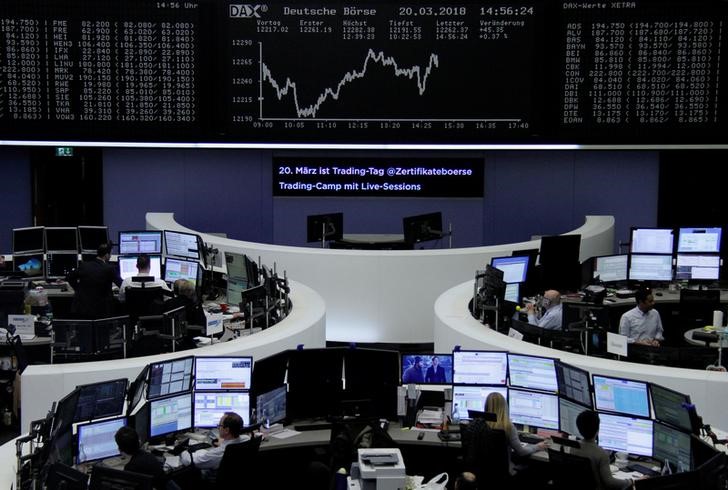LONDON (Reuters) - Following are five big themes likely to dominate thinking of investors and traders in the coming week and the Reuters stories related to them.
1/INFLATION DOG TO BARK?
Stubbornly low inflation has been described as the dog that didn't bark. Indeed, inflation has stayed weak even as global stocks have rallied hard in the past decade. But is the dog about to start barking?
It's a question markets are sensitive to, and Friday's consumer inflation data will be next week's most closely-watched U.S. data point.
Year-on-year core CPI, which measures prices that consumers pay for frequently purchased items, has been inching up. June's core CPI was 2.3 percent and is seen holding steady in July. But on a monthly basis, prices are expected to rise 0.2 percent versus a 0.1 percent increase in June, Reuters forecasts show.
June's near-flat reading was driven by moderate gasoline price gains and falls in apparel and hotel costs. The U.S. Federal Reserve's preferred inflation measure, the PCE price index, has also this year hit the 2 percent target for the first time in six years.
2/BACK TO JAPAN
The Bank of Japan's plan to give banks some relief from years of near-zero rates proved to be a minor policy tweak that lifted the upper bound of its 10-year yield target to 0.2 percent. Yet for a market resigned to seeing ultra-long bond yields trending steadily down to zero, even this small step was significant.
Thirty-year bonds, popular with Japanese pension funds and insurers, saw yields spike 17 basis points to 0.85 percent in less than two weeks. That took yields close to the one percent level at which insurers' returns match the payout promises they made to policyholders.
If yields keep rising, government bond returns will compensate local investors for the narrow spreads they currently make on fully-hedged purchases of U.S. Treasuries or German Bunds. Japanese investors have already started selling Treasury holdings. Their total foreign debt investments amounted to $2.1 trillion at the end of 2017 -- data on Thursday will show if these holdings are being pared back.
3/YUAN TRADE
Washington has imposed duties on $34 billion of imports from China, and threatened more. Beijing has announced levies on $60 billion of U.S. goods. And as the trade war gets going, China-watchers will keep eyes trained on next week's July trade figures to gauge the initial damage from the spat.
They will also watch the yuan. Having hit 14-month lows, it rallied after authorities raised forward forex reserve ratio requirements.
It is unclear whether a weak currency is part of China's stimulus toolkit or a means of retaliation against tariffs. Historically, there is no correlation between the exchange rate and the bilateral trade between the two countries. But a weaker currency will doubtless make life easier for exporters.
The week may show if the currency has indeed hit a trough, or if the central bank move was just a warning to speculators who have started seeing yuan weakness as a one-way bet.
4/ITALIAN BONDS AND BANKS
As more Italian banks report second-quarter earnings, numbers from UniCredit, the country's biggest lender by assets, and smaller peers will be scanned for signs of damage from sovereign stress. BPER Banca , Credito Valtellinese (MI:PCVI) and Popolare di Sondrio (MI:BPSI) are among lenders due to report results. A bond market rout in May around the formation of an anti-establishment coalition government is likely to have inflicted painful cuts to the value of banks' holdings of government bonds. Italy's worsening outlook has already driven 10 consecutive weeks of earnings downgrades.
The key metric to watch is the capital adequacy CET1 ratio and how this was impacted by the sell-off in government bonds. Reported by banks alongside profit-and-loss statements, the CET1 highlights the gap between banks with healthy balance sheets and others whose capital buffers are thin.
Fears are that the finances of Italy's weaker banks are on shakier grounds. A drop in bond values caused a 140 basis point (bps) hit to Monte dei Paschi's CET1 (MI:BMPS), while heavyweight Intesa Sanpaolo (MI:ISP) announced a manageable 35 bps erosion.
The focus on capital erosion may even overshadow banks' progress in reducing non-performing loans. Executives will also be quizzed on how they assess political risks before the next budget comes up for discussion in autumn.
5/IT'S HOTTER IN TURKEY
Turkey's collapsing lira may have driven inflation to over 14-year highs but it's done wonders for the country's tourist industry, which enjoyed a 30 percent surge in the number of foreign visitors in June.
Those tourism revenues may help with Turkey's other big economic problem -- its current account deficit. They are a major source of funding for the deficit which ballooned to $5.885 billion in May, well above forecasts.
Figures for June are out on Friday. They could determine if the lira suffers another major leg lower, after tumbling this week to new record lows below 5 per dollar <TRY=>.
